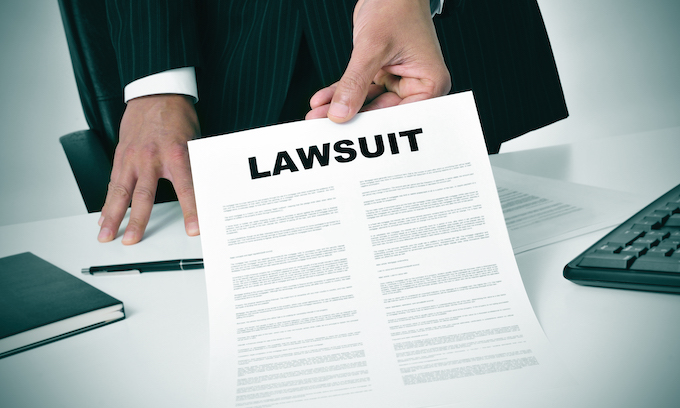The NAACP filed a lawsuit against former President Donald Trump and others over their role in the Jan. 6 attack on the U.S. Capitol — and it cites a rarely used law passed after the Civil War.
The suit — filed Tuesday in the U.S. District Court in Washington, D.C., on behalf of U.S. Rep. Bennie Thompson, a Mississippi Democrat — alleges that Trump, his personal attorney Rudy Giuliani and the groups the Proud Boys and the Oath Keepers violated the Ku Klux Klan Act of 1871 when they attempted to prevent Congress from certifying the results of the 2020 election.
“The defendants each intended to prevent, and ultimately delayed, members of Congress from discharging their duty commanded by the United States Constitution to approve the results of the Electoral College in order to elect the next President and Vice President of the United States,” the suit says.
It goes on to say Trump and Giuliani “engaged in a concerted campaign to misinform their supporters and the public, encouraging and promoting intimidation and violence in furtherance of their common plan to promote the re-election” of Trump.
A spokesperson for Trump said in a statement to The Hill that Trump did not incite violence, pointing to his recent acquittal of impeachment charges in the U.S. Senate. Giuliani didn’t respond to a request for comment from CNN.
At a a rally prior to the Jan. 6 siege, Trump told his supporters to march on Capitol Hill and touted false claims that the election was fraudulent and stolen from him. Rioters then did and stormed the building as Congress was certifying the election results — forcing lawmakers to evacuate and resulting in five deaths.
Lawmakers from both parties, at least in part, pinned the attack on Trump’s rhetoric surrounding the election, and a week later, the U.S. House of Representatives impeached him on a charge that he incited an insurrection. The U.S. Senate then held a trial on whether to convict him of that charge and eventually acquitted him Saturday.
Now, the lawsuit says Trump and others violated the Ku Klux Klan Act by conspiring to prevent members of Congress from “discharging these official duties.” Here’s what to know about the act.
History of the Ku Klux Klan Act
When the 14th Amendment to the U.S. Constitution was ratified in 1868, it granted citizenship to all people born or naturalized in the United States, including formerly enslaved people. It also guaranteed citizens equal protection under the law.
Despite the amendment, there were efforts in some states to deny Black citizens their rights and to undermine Reconstruction, or the reintegration of southern states that had been part of the Confederacy.
“Members of the Ku Klux Klan, for example, terrorized Black citizens for exercising their right to vote, running for public office, and serving on juries,” the U.S. Senate archives say.
So, Congress passed multiple “enforcement acts” in 1870 and 1871 in response. Included in the statutes was a provision nicknamed the Ku Klux Klan Act, which was introduced in March 1871 by Rep. Samuel Shellabarger of Ohio. It was later signed into law by President Ulysses S. Grant in April.
What does the act do?
The Ku Klux Klan Act was designed to eliminate the violence against Black Americans and to protect the rights of those recently freed from slavery.
It allowed the president to “use the armed forces to combat those who conspired to deny equal protection of the laws and to suspend habeas corpus, if necessary, to enforce the act.”
And tucked into the law, parts of which were later included in Title 42 of the U.S. Code, is Section 1985. In part, the section allows civil action to be brought against anyone who prevents public officials from carrying out their duties through “force, intimidation or threat.”
The lawsuit against Trump cites this section, saying it “was intended to protect against conspiracies, through violence and intimidation, that sought to prevent Members of Congress from discharging their official duties.”
Parts of the Ku Klux Klan Act have “served as the basis for many federal court lawsuits against state and local officials,” according to the Federal Judicial Center.
Sections of the act, which has been “the subject of voluminous interpretation by the courts,” have been used in cases where a “state actor” violates rights granted by the federal government, according to Politico.
Today, the act is most commonly used in cases of unreasonable search and seizure and lawsuits related to false arrests or police brutality.
___
(c)2021 The News & Observer (Raleigh, N.C.)
Visit The News & Observer (Raleigh, N.C.) at www.newsobserver.com
Distributed by Tribune Content Agency, LLC.
—-
This content is published through a licensing agreement with Acquire Media using its NewsEdge technology.



















do away with the naacp the ms black america pagent the united negro college fund blm and blk entertainment television.
if i cant have they should not have it either.
AND if trump and co, are “Guilty of violating it’, WHAT about all the attempts to NULLIFY THE VOTE from 2016, that the left’s been engaged in>?
OR like i suspect, is THEIR act to force “congress to not be able to perform their duties”, in 2016, them “Standing up for democracy”, and thus was OK…
The Democratic Party defended slavery, started the Civil War, opposed Reconstruction, founded the Ku Klux Klan (KKK), imposed segregation, perpetrated Lynchings, and fought against the civil rights acts of the 1950s and 1960s.
But The Blacks think that the racist, hypocritical, dishonest Democrats care for them.
The Democrats ONLY care for your vote!!
“The Ku Klux Klan Act was designed to eliminate the violence against Black Americans” Hummm….
I.A.W. U.S. Census & FBI (Table 43a) Black males make up about 8% of the U.S. population but commit 53% of all the murders and 55% of all robberies in the U.S… Every year there are ~6,000 African-Americans men, women and children killed and 94% of them were killed by fellow African-Americans.
Where is the outrage from “Black Lives Matter” and prominent members of the African-American community?
ANd we consistently hear about “systemic racism”, from city after city< YET THOSE CITIES have for decades, been under, you guessed it. DEMOCRAT CONTROL!
U.S. Rep. Bennie Thompson, a Mississippi Democrat, you Democrat communists “violate” our Constitution. So Bennie, you are a traitor to our Country. How is that for a “violation” Bennie?
“It allowed the president to “use the armed forces to combat those who conspired to deny equal protection of the laws and to suspend habeas corpus, if necessary, to enforce the act.””
Negating a legal “show up in person with proper ID” vote, with an illegal “Mail-in can’t prove who actually voted,” Vote,,,is to deny the LEGAL voter equal protection under the law, and is in fact actual empirical outright DENIAL of any protection under the law.
When it comes to fraud elections, these Democrat demons make the KKK look like choir boys.
Not surprising, Since the DNC FOUNDED the KKK, to stop the blacks from voting Republican!
The only CONSPIRACY here, is the Democrats (and their willing accomplices in the [so-called] “main stream” media and the corrupt JUDGES) engaged in Election Fraud, and their conspiracy to HIDE and DENY the EVIDENCE!
There is incontrovertible EVIDENCE that States’ Election Laws were violated.
There’s the Surveillance video SHOWING boxes of ballots being pulled out from under covered tables (after observers had been sent home), and those ballots being fed into the counting machines MULTIPLE TIMES!
These are FACTS!
Those FACTS and Congress’ and Judges’ REFUSAL to even HEAR the evidence is what drove these “peaceful and patriotic” protesters to “make their voices heard” at the Capitol!
THEY were RIGHTLY indignant at being DISENFRANCHISED (having their votes nullified by FRAUD)!
If you want to file lawsuits against ANYONE, it should be against the aforementioned Democrats/Members of Congress/Judges who CONSPIRED to inflame the voters!
Oh, and you seemed to OMIT the FACT that the Ku Klux Klan was FOUNDED by like-minded DEMOCRATS (remember Senator Robert Byrd?)
Facts.. WE need no stinkin facts
Wonder if white people can use that act against BLM, NAACP, Democrat party. That is, the modern day KKK members and the stooges supporting them. For example it’s clear Jackson Lee’s gun control bill is a modern day Jim Crowe law. To be able to have a gun at all you’re talking many thousands, probably more than 10 thousand dollars. What she calls insurance alone is $800/year and in Canada it’s under $25. So clearly it’s meant to hurt black people and is racist. I know she’s black. Doesn’t mean she’s not racist. Gun control is always about racism and power over others.
I am not surprised, that they are NOT CALLING her bill, racist.. THEY ARE THE PARTY OF RACISM!
Trump needs to get off his fat duff and start a new media company (or purchase an existing one) to replace Fox. He then needs to take the 80 million people that voted for him and start a new political party to replace the GOP.
Message to Trump, (as well as the GOP if they care to listen):
There are well over 80 million of us right now (and growing). After what the RHINOs pulled with the 2nd Impeachment Hoax (Romney, Burr, Cassidey, Collins, Murkowski, Sasse, Toomey and you too McConnell – are you listening GOP?) – we are not voting for any GOP member – EVER!
So Mr. Trump (if you are listening), you are either with us and are willing to start a new political party (and media company) – OR GET OUT OF THE WAY. If you do nothing, it is yours to loose.
Personally, I don’t care if another GOP member ever wins another election – EVER. It’s a new party for me or I am not voting. Bye Bye GOP.
It also guaranteed citizens equal protection under the law.
Yet all but white conservatives seem to enjoy those protections. When a white presidential candidate was spied on by a black president there was no ‘equal protection under the law’. When an election was stolen there was no ‘equal protection under the law’. When a white president exercised his first amendment rights there was no ‘equal protection under the law’
So tell us all about ‘equal protection under the law’ Libs.
Add to that HOW MANY ILLEGAL invaders, do they seem to LOVE EXTENDING all those protections to, WHILE DENYING WE Citizens those same protections?!
“…anyone who prevents public officials from carrying out their duties through “force, intimidation or threat.”
Since they never prohibited a public official from carrying out their duties, this entire suit should be moot.
These guys must think everyone else is as dumb as they are.
All last year,we saw RIOTING folks, who literally INTIMIDATED AND THREATENED mayors and governors, SO HOW WERE those folk, not ‘using threat of force, to prohibit a public official from doing his job”???
I would venture to say the law was designed for the protection of those in congress as it would serve to stop the citizens from protesting/demanding that their representatives actually represent those who put them into office. It would seem that congress critters have in reality NEVER kept allegiance to the voters who elect them to represent them. Congress is the most corrupt bunch of hooligans in the entire nation.
Jackass needs to learn how to read. He can start with the Constitution.
If Trump and the others that are cited in the lawsuit are guilty THEN so are all the Democrats who worked to nullify the 2016 election results and the electoral college vote. In addition, EVERY Democrat who has suggested it is appropriate to act violently against Trump supporters over the last few years also need to be charged.
“At a a rally prior to the Jan. 6 siege, Trump ….. touted false claims that the election was fraudulent and stolen from him.
Prove it!
The left, NEVER seems to have to PROVE anything with facts. They (it seems) can just ACCUSE and cry foul, and it is so…
“Show me the man and I will find the crime.”
— Lavrenti Beria